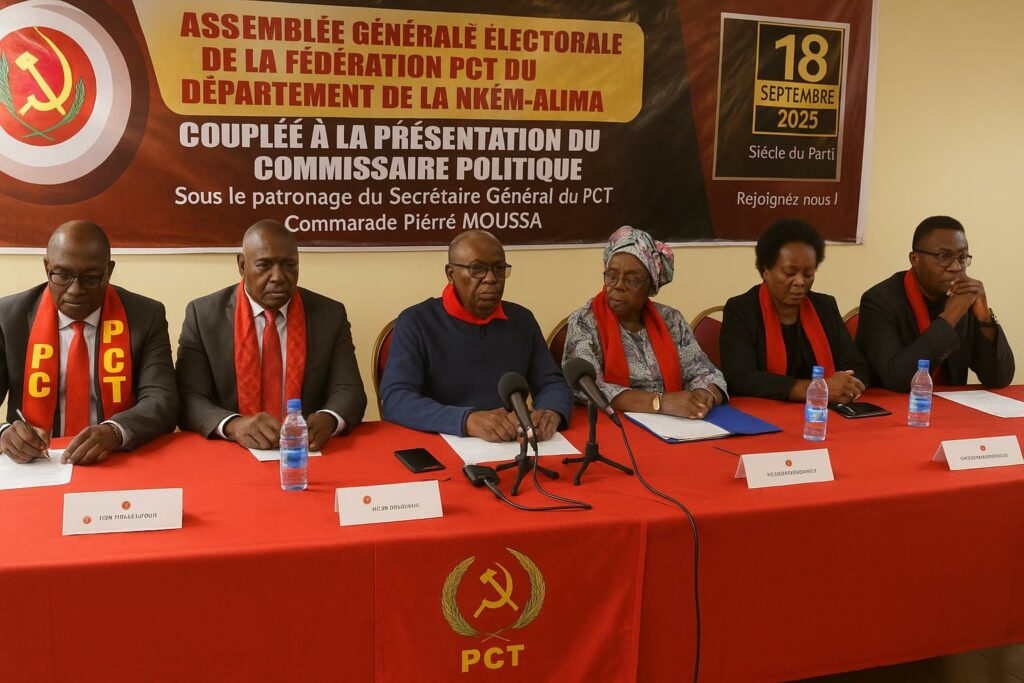A nascent department at the heart of party renewal
The Republic of Congo’s political cartography has just been redrawn with the advent of the Nkéni-Alima department. Its six districts—Gomboma, Makotipoko, Ongony, Ollombo, Abala and Allembé—have been detached from the historical Plateaux region, giving local actors a fresh institutional arena. Far from being a purely administrative exercise, the change anchors the Congolese Party of Labour (PCT) more firmly in a territory described by observers as both demographically dynamic and agriculturally promising, aligning with the national objective of balanced regional development championed by President Denis Sassou Nguesso.
Yves Fortuné Moundele-Ngollo Ehourossia takes the floor
In Gomboma, the new departmental capital, an emotion-laden general assembly met under the supervision of PCT secretary-general Pierre Moussa. The sole deputy for Ongony, Yves Fortuné Moundele-Ngollo Ehourossia, emerged from the ballot as president of the Nkéni-Alima federal council. In his inaugural address he pledged to “channel every ounce of collective energy toward consolidating the party’s grassroots”, insisting that cohesion and discipline would remain the watchwords of his mandate. The choice of a sitting parliamentarian signals a deliberate attempt to synchronise legislative, governmental and partisan agendas in a region expected to play a decisive role in upcoming national consultations.
Strategic roadmap to the December congress
The new leadership’s window for action is narrow. The PCT’s 6th ordinary congress convenes in December, with internal reports to be finalised well before that date. Pierre Moussa reminded participants that the renewal of electoral lists constitutes an immediate priority, urging militants to “contribute actively so that every legitimate voter is counted”. The instruction is consistent with the party’s long-standing emphasis on regular institutional practice and with government policy geared toward enhancing electoral transparency. For Nkéni-Alima, the revision exercise doubles as a baptism of fire: it will test the operational coherence of a department still organising its prefectural services and commune councils.
Institutional implications for local governance
The installation of Pierre Mabiala as political commissioner adds an administrative dimension to the restructuring. His portfolio covers coordination between the federal council, district committees and national headquarters. Analysts suggest that the pairing of Mabiala’s technocratic profile with Moundele-Ngollo’s parliamentary authority could accelerate the alignment of provincial development plans with the 2022–2026 National Development Strategy. In practice, this may translate into expedited road maintenance programmes along the Alima River corridor and a stronger interface with agri-business investors attracted by the zone’s fertile floodplains.
Legal focus: electoral compliance and party discipline
Beyond organisational enthusiasm, the leadership must navigate a dense legal environment. The organic law on political parties obliges any new departmental structure to file its statutes within thirty days at the Constitutional Court. Compliance will be monitored closely, all the more so as the PCT has repeatedly presented itself as a standard-setter in matters of statutory regularity. Failure to observe deadlines could expose the council to formal warnings. Insiders, however, downplay such a risk, citing the presence of seasoned jurists in the secretariat and the tutelage provided by national headquarters.
Key takeaways for militants and citizens
The birth of the Nkéni-Alima federal council crystallises three trends that extend beyond partisan lines. First, it confirms the administration’s commitment to decentralisation, an axis underscored during the 2015 constitutional reform. Second, it illustrates the PCT’s methodical preparation for its forthcoming congress, where policy orientations for the next five years will be codified. Finally, it foreshadows a more competitive legislative landscape in which candidates will be assessed not only on national programmes but also on their capacity to deliver local public goods. By placing a sitting lawmaker at the department’s helm and mandating an experienced commissioner, the party seeks to convert institutional novelty into electoral capital while keeping faith with the governance principles advocated by the head of state.

